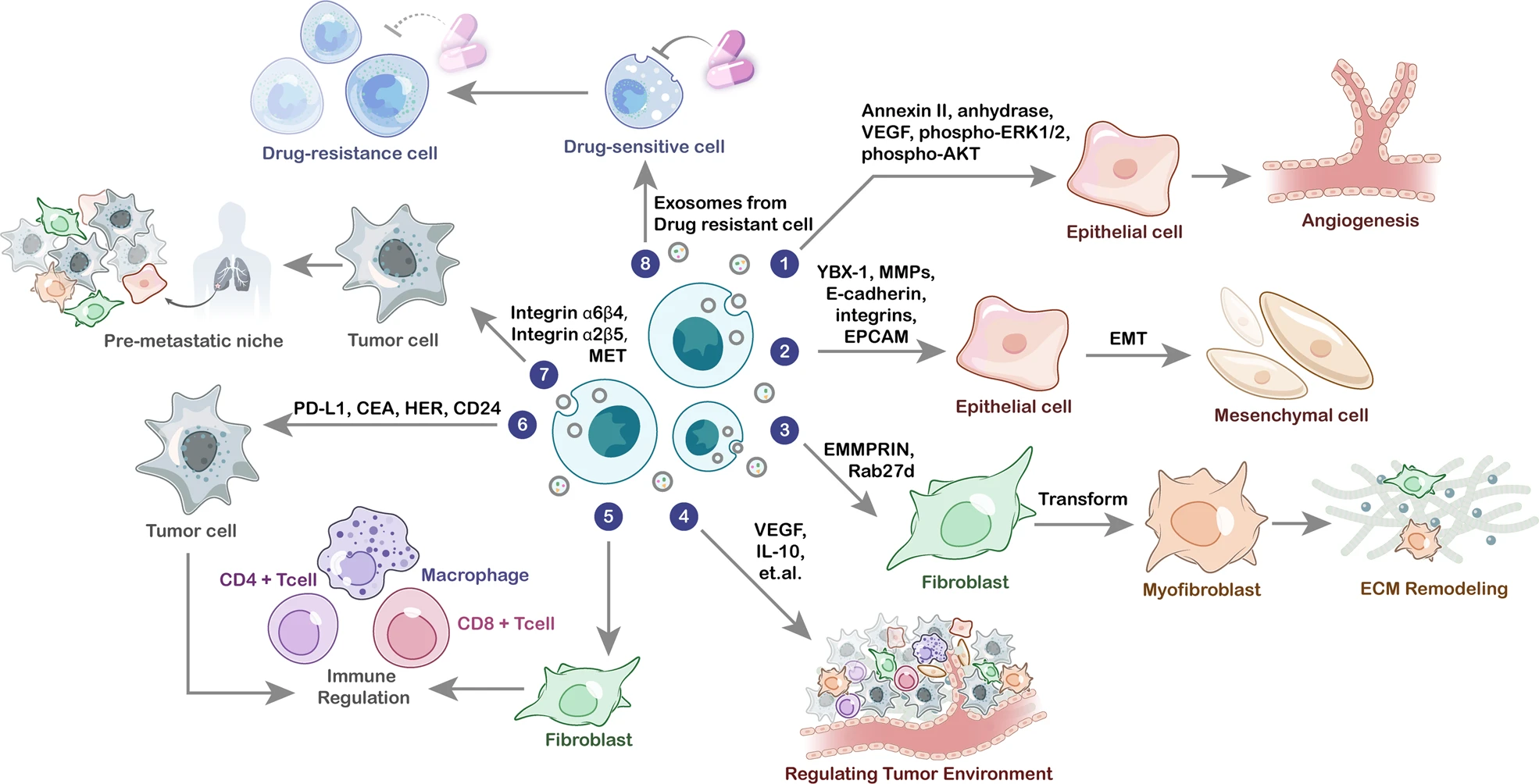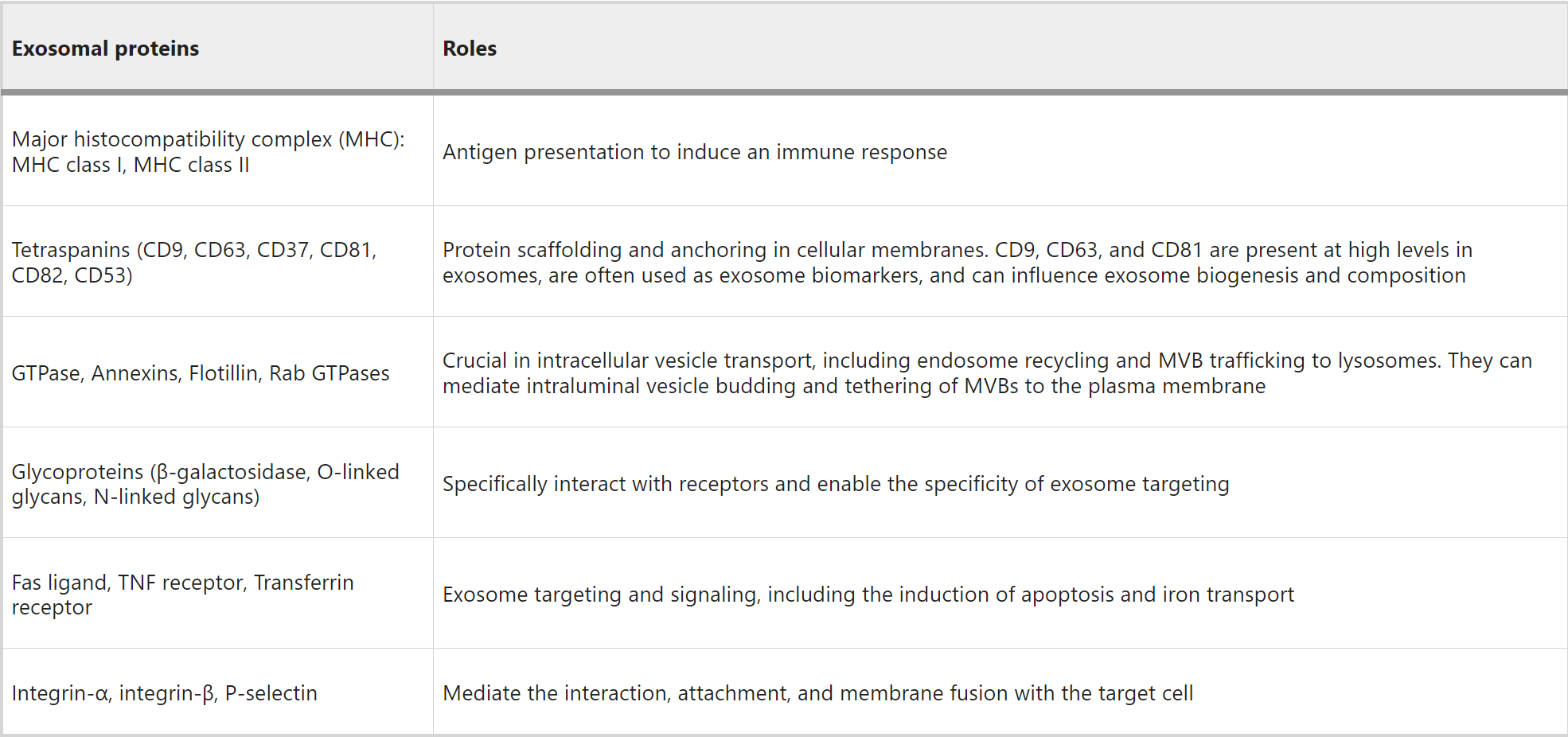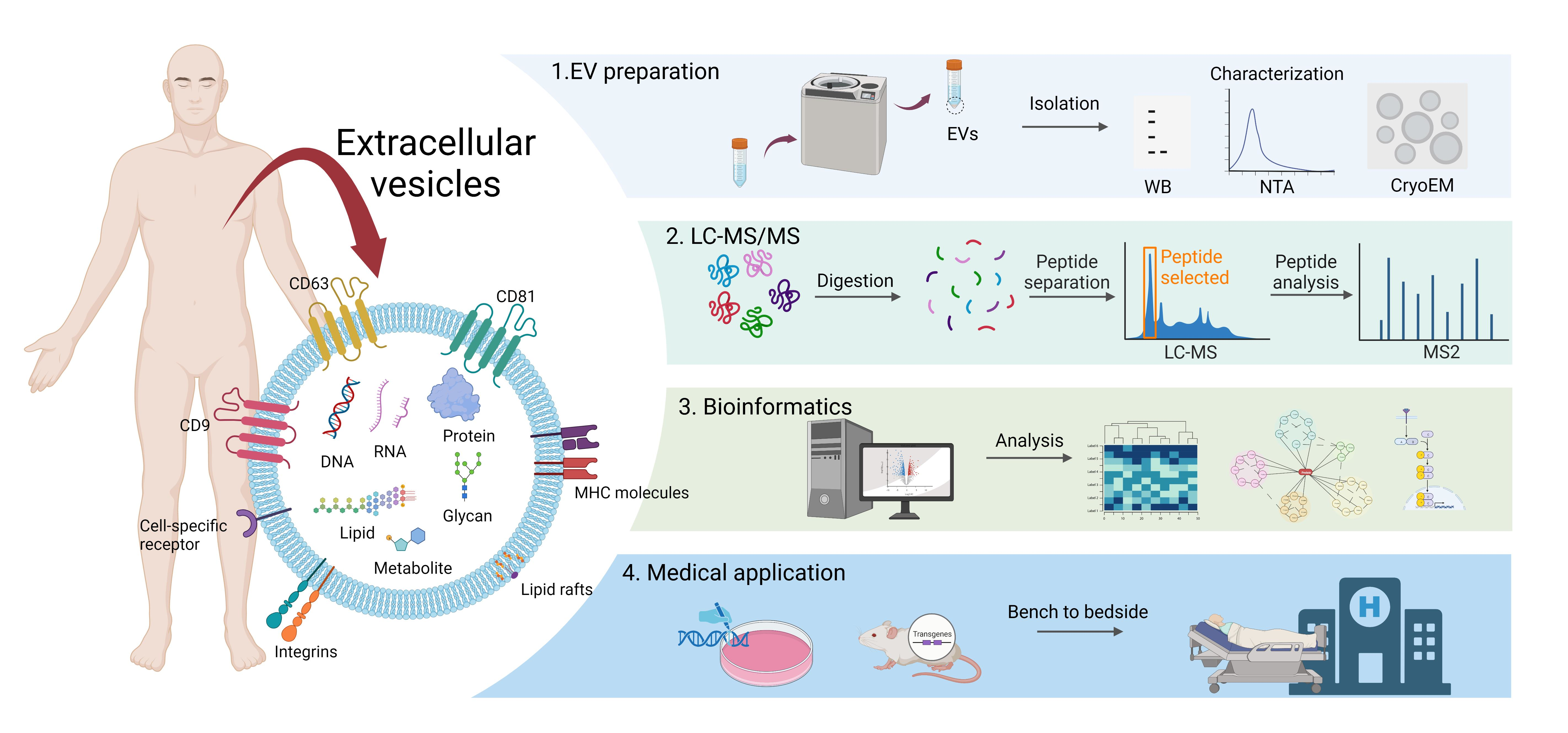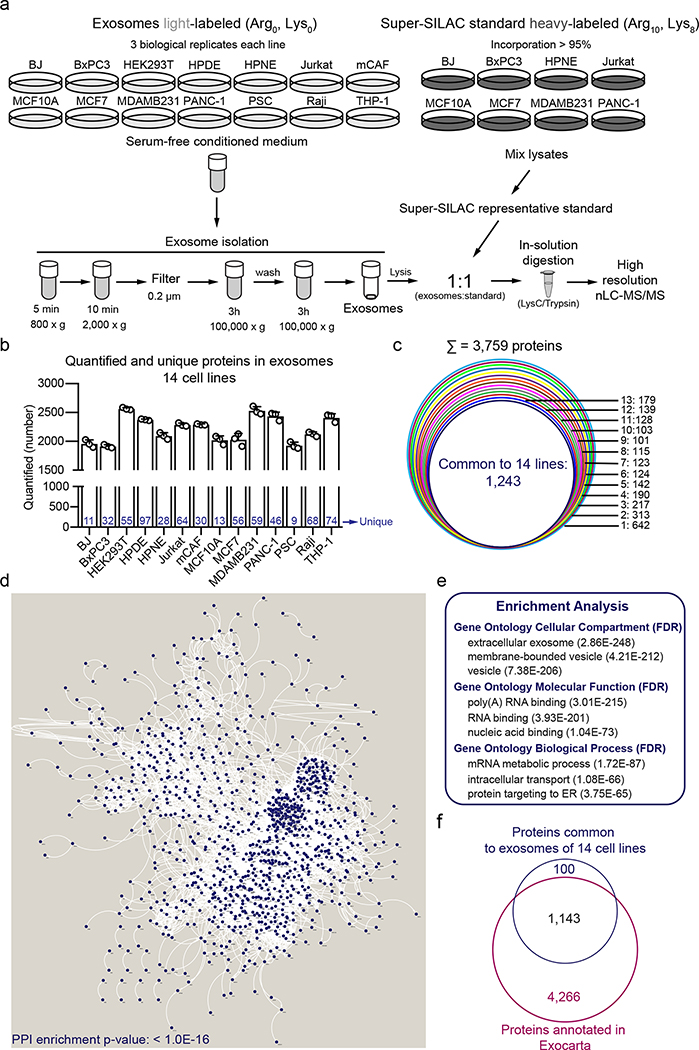Ultra-sensitive Targeted Exosomal Proteomic Detection Service
- Efficient exosome purification is achieved through antibody-conjugated magnetic beads or size exclusion chromatography (SEC).
- Strict quality control of particle size distribution and surface markers (e.g., CD9, CD63, CD81) is performed using nano-flow cytometry (nanoFCM).
- High-affinity antibodies or aptamers are employed for specific enrichment of target proteins.
- Optimized enzymatic digestion protocols generate stable and detectable peptide fragments.
- Detection is performed using Orbitrap Exploris™ 480 high-resolution mass spectrometry platform, combined with Multiple Reaction Monitoring (MRM) for targeted peptide scanning, achieving sub-femtogram (fg) level sensitivity, which is two orders of magnitude higher than traditional methods.
- Peak alignment and quantitative normalization are conducted using Skyline software.
- Functional annotation and pathway enrichment are performed using KEGG, GO, and other databases.
- Ensuring a comprehensive logical chain from raw data to biological insights, enabling accurate and actionable conclusions.
-
Applicable Sample Types:
Serum (≥2 mL), Plasma (anticoagulated, ≥2 mL), Cell culture supernatant (after centrifugation), Cerebrospinal fluid (CSF) (≥1 mL), or Tissue lysates (require special pre-treatment). -
Key Pre-treatment Steps:
Liquid samples should undergo 4°C gradient centrifugation within 30 minutes of collection to remove cell debris and be immediately stored at -80°C; avoid repeated freeze-thaw cycles (≤2 times).
Exosomes, as critical mediators of intercellular communication, carry proteins, nucleic acids, lipids, and other bioactive molecules, participating in essential biological processes such as cell signaling, immune regulation, and tissue repair. Among them, the exosomal proteome exhibits high heterogeneity: on one hand, its composition dynamically reflects the physiological status of parental cells (e.g., tumor-derived exosomes enriched in PD-L1, EGFR, and other signaling proteins); on the other hand, abundance changes of specific proteins are closely associated with disease pathogenesis and progression (e.g., abnormal accumulation of Aβ and Tau proteins in exosomes from the cerebrospinal fluid of Alzheimer's disease patients). This makes exosomal proteins a goldmine for biomarker discovery and targeted drug development.

Wang, X. et al. Exp Mol Med. 2022.
Figure1. The Role of Exosomal Proteins in Cancer Biology
However, exosomal protein research faces three major technical challenges:
① Scarcity of samples (only about 10⁹ exosomes per 1 mL of plasma);
② High-abundance proteins masking low-abundance targets (e.g., interference from serum albumin);
③ Insufficient sensitivity of conventional mass spectrometry techniques (common detection limits exceeding 1 ng).
To address these challenges, MtoZ Biolabs offers Ultra-sensitive Targeted Exosomal Proteomic Detection Service that integrates cutting-edge separation and enrichment technologies with ultra-sensitive mass spectrometry platforms, aiming for precise profiling of targeted exosomal proteins. This service provides end-to-end solutions, from biomarker discovery to mechanistic validation, tailored to meet the needs of both research and clinical applications.

Wang, X. et al. Exp Mol Med. 2022.
Figure2. Exosomal Surface Proteins and Their Roles
Service at MtoZ Biolabs
As a pioneer in the field of exosome multi-omics, MtoZ Biolabs integrates nanoscale exosome purification technologies, high-affinity targeted enrichment systems, and an AI-driven intelligent data analysis platform, overcoming core challenges in traditional methods such as low detection rates of trace proteins, poor data reproducibility, and long clinical translation timelines.
Our Ultra-sensitive Targeted Exosomal Proteomic Detection Service addresses the full spectrum of needs, from basic research to industrial application:
✅ Accurately profile picogram-level functional proteins (e.g., PD-L1, Tau protein) from individual exosomes
✅ Support simultaneous quantification of over 200 target proteins across thousands of cohort samples
✅ Deliver high-resolution molecular maps for disease mechanism research
✅ Facilitate liquid biopsy panel development, cell therapy quality control, and dynamic monitoring of drug efficacy

Fan, S. et al. Proteomes. 2023.
Figure3. Proteomic Research of Extracellular Vesicles in Clinical Biofluid
Technical Principle
The Ultra-sensitive Targeted Exosomal Proteomic Detection Service is built on a three-tier strategy: Targeted Enrichment – Ultra-sensitive Detection – Intelligent Analysis.
1. Targeted Enrichment:
2. Ultra-sensitive Detection:
3. Intelligent Data Analysis:
Service Advantages
1. Targeted Detection and Precise Quantification of Exosome-specific Proteins
Through high-affinity antibody/aptamer pre-enrichment combined with Multiple Reaction Monitoring (MRM) technology, Ultra-sensitive Targeted Exosomal Proteomic Detection Service achieves absolute quantification of key proteins such as PD-L1, Tau, EGFR, with target coverage exceeding 95%.
2. Ultra-high Sensitivity and Specificity in Protein Detection
By integrating the Orbitrap Exploris™ 480 mass spectrometer's million-level resolution with nano-flow cytometry (nanoFCM) pre-screening, the signal-to-noise ratio is significantly enhanced. Even in serum samples heavily interfered with by abundant proteins (e.g., albumin), target molecules can be stably detected.
3. Parallel Multi-target Analysis within a Single Sample
Each experiment can simultaneously detect over 200 protein targets, supporting large-scale screening across signaling pathways, functional modules, or disease-related molecular panels.
4. Extremely Low Sample Consumption and Clinical Compatibility
Requires as little as 1 mL of serum or 0.5 mL of cerebrospinal fluid (CSF) to complete a full analysis, breaking traditional limitations on sample amount for precious clinical specimens and enabling clinical cohort studies.
Sample Submission Suggestions
Note: If you have special requirements or need assistance with sample preparation, please feel free to contact us.
Applications
1. Disease Mechanism Exploration and Biomarker Discovery
Analyze the dynamic changes of exosomal proteins during pathological processes such as cancer, neurodegenerative diseases, and cardiovascular diseases, identifying key regulatory molecules involved in disease progression.
2. Drug Development and Efficacy Evaluation
Monitor the impact of targeted therapies on the exosomal protein profile of cells, providing novel molecular indicators for drug efficacy assessment and mechanism of action studies.
3. Diagnostic Kit Development
Based on the identified specific protein signatures, develop high-sensitivity liquid biopsy detection panels, facilitating early diagnosis, disease stratification, and treatment monitoring.
Case Study
Despite the pivotal biological and translational significance of exosomes, bona fide universal protein biomarkers that can identify this subtype of extracellular vesicles (EVs) are still lacking. Here, we analyzed the proteome of exosomes derived from 14 cell lines exploiting state-of-the-art MS-based proteomics with Super-SILAC for robust protein quantification. Using this unbiased approach, we identified more than 1,200 ubiquitous proteins that likely comprise the core proteome of exosomes. Among those, 22 proteins were consistently enriched in exosomes from different origins, thus representing a candidate pool with potential utility for exosomal biomarkers. We also identified a cohort of 15 low abundant proteins in exosomes that can be utilized as exclusion biomarkers. Finally, our data suggests that Syntenin-1 is the most abundant ubiquitous protein associated with exosomes from different cellular sources.

Kugeratski, F. G. et al. Nat Cell Biol. 2021.
Figure4. Super-SILAC-based proteomics identifies the core proteome of exosomes
In summary, our work provides a comprehensive quantitative atlas of ubiquitous exosomal proteins that can serve as a resource for the scientific community dedicated to the study of exosomes, and identifies Syntenin-1 as the most abundant protein in exosomes from distinct origins, thus emerging as a promising candidate as universal biomarker of exosomes.
How to order?







